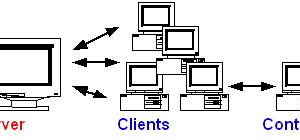Netscape source is now free, who would have thought it? Eric Raymond, that’s who. Here are his insights into this momentous event.

One of the strangest and most disorienting feelings to experience is waking up and realizing you’re making history. I had that feeling the day of Netscape’s bombshell announcement on January 23, 1998. They announced they would be releasing the source for Navigator 5.0. I think the Linux community as a whole is having that same experience now.Netscape’s Chief Technology Officer told me, “On behalf of everyone at Netscape, I want to thank you for helping us get to this point in the first place. Your thinking and writings [“The Cathedral and the Bazaar”, http://www.earthspace.net/~esr/writings/cathedral-bazaar/] were fundamental inspirations to our decision.” That made me feel pretty good—I think the best part wasn’t the praise for me, it was the astonishing victory for the Linux culture that it represents.
My paper only explains the bazaar development model; I didn’t create or discover it. The bazaar model was grounded in old-time Unix tradition that has been brought to full fruition by Linus Torvalds and the thousands of Linux volunteers out there who made it work. Netscape’s move is a victory for all of us—and, perhaps, a harbinger of greater victories to come if we work hard and smart.
Yes, I know Netscape’s maneuver was partly one of desperation. Microsoft’s Internet Explorer has been winning the marketing war. Netscape’s stock price had been dropping. Netscape had to change the rules to stay in the game. But forced or not, the change matters a lot—and Wall Street knows it, because Netscape’s stock has since been rising.
Netscape people chose our rules because they believe in them. Ten days after the announcement, I flew to Silicon Valley at Netscape’s invitation for a day-long strategy meeting at which we tried to hammer out solutions to the problems the company will face in making the bazaar model work. One thing I heard over and over from their people was a huge sense of relief—almost gratitude that market conditions had gotten so bad that they could justify doing what they wanted to do anyway.
Within hours after the strategy session, I was briefing a standing-room-only crowd of over 200 at the Silicon Valley Linux Users Group meeting. I told them that within the next eight weeks, Netscape would be posting its proposed source license on the Web for public comment from the hacker community.
Also, I explained why I flew out to help Netscape without charging them a dime—because, like it or not, Netscape has put our prestige on the line, too. If Netscape screws up its implementation, the free-software model will be so thoroughly discredited that it could be more than a decade before corporate America is willing to try it again. We’ve all got to be Netscape’s allies now, because for our sake they must win.
Before and during my trip to the Valley, I got together with a good many of the Linux community’s tribal elders, including Linus Torvalds, John “maddog” Hall, Bruce Perens, Larry Augustin, Dan Quinlan, Phil Hughes and others. We’re all acutely conscious that it’s crunch time—the long-awaited breakout of free software into the commercial world is happening, it’s happening now, and the decisions we make in the next few months will be absolutely critical.
One conclusion we’ve already reached is that the term “free software” is itself a problem. The problem with it is twofold. First, it’s confusing; the term “free” is very ambiguous (something the Free Software Foundation’s propaganda has to wrestle with constantly). Does “free” mean “no money charged”? Does it mean “free to be modified by anyone”? Or something else?
Second, the term makes a lot of corporate types nervous. While that does not intrinsically bother me in the least, we now see an opportunity to convert business people rather than thumbing our noses at them. Netscape’s announcement and the buzz in Wired, Wall Street Journal and elsewhere means we have a window of opportunity. If we don’t exploit it, the window will close—but if we do, and do it right, we can make serious gains in the mainstream business world. A better label will position us to do that without compromising our ideals and commitment to technical excellence.
We did a lot of brainstorming about this issue and came up with a happy result. We suggest that everywhere we have previously talked about “free software”, we now say “open source”–open-source software—the open-source model, the open-source culture, the Debian Open Source Guidelines. Eventually, creating an open-source branding program for commercial vendors who want to play.
We should publicly explain the reason for the change. Linus has been saying in his “World Domination 101” speech that the open-source culture needs to make a serious effort to take the desktop and engage the corporate mainstream. Of course he’s right—and this re-labeling, as Linus agrees, is part of the process. It says we’re willing to work with and co-opt the market for our own purposes, rather than remaining stuck in a marginal, adversarial position.
Bruce Perens of Debian has volunteered to register “open source” as a trademark and hold it in trust through Software in the Public Interest. Richard Stallman has agreed to use the term, provided he can be convinced that the new “Open Source” version of the Debian Free Software Guidelines won’t weaken them.
Over the next several months I’m going to be seriously pitching the open-source concept to corporate America. I’m going to be talking about the three business models I see for making money from open sources:
- The Cygnus/Red Hat/BSDI model: give away source, sell service and support.
- The Netscape model: use open-source software as a loss leader and market positioner for commercial software.
- The hardware-store model: outsource development of the device drivers and interface tools for your widget to a bazaar effort centered on your web site and led (but not monopolized) by in-house programmers.
I’m also going to be invoking the idea of “peer review” a lot. Open-source software is peer-reviewed software, and thus more reliable and respectable than that icky closed stuff.
In the near future, I think our best tactic is to go after companies that fit the “hardware-store” model. For those outfits, software development is strictly a cost rather than a profit center or part of their corporate identity. If we can show them a way to get much better software and better market position for minimum effort, they’ll have every reason to go for it.
A couple of easy wins in that arena will help Netscape and other early pioneers feel less lonely and maybe even convince Wall Street that it’s seeing a trend. This will position us to go after the big guys—Sun, SGI, Apple and Novell.
Every CEO and CTO I talk with is going to hear the same thing. First, I’ll ask if they have any strategic problem bigger than “Microsoft is going to crush me within five years.” Then I’ll point out that nobody has ever beaten Bill Gates playing by Bill Gates’ rules. Then I’ll tell them, “The only way to survive is to change the rules—and I’m here to show you how.”
I hope everybody reading this will help. You are the people who got open-source software this far; I’m just your tribune, a sort of accidental ambassador to the suits. Frankly, I’d rather be hacking; however, this is a job that needs doing that I’m fairly well equipped for, so I won’t shirk it. If you want to help, and you work for a company you think might be a good target, here are some things you can do:
- Point your boss to http://www.earthspace.net/~esr/writings/cathedral-bazaar and ask him to do the same with his boss. Hey, it’s worked so far!
- If you can get the ear of your Chief Executive Officer or Chief Technology Officer, e-mail and tell me. Then work with me to get me in the door, so I can make the open-source pitch for us.
- If you work for the trade press, talk to me. The more positive publicity we get, the better chance we have of creating a positive climate of opinion that will make it easy for CEOs to say “yes”.
I don’t want to be the only ambassador, but the ambassadors at least all have to be telling the same story. Once the effort starts taking clearer shape, there will be a mailing list and a web page and other resources aimed at helping open-source advocates reach out to corporate America during this critical time.
We techies have been trying to win for Linux/Unix and open standards/open source by quiet pressure from below for twenty years, and for the most part it hasn’t worked. Now, after Netscape, we’ve got another chance—to break in from above. Let’s do it together!
 Linux, Linux OS, Free Linux Operating System, Linux India Linux, Linux OS,Free Linux Operating System,Linux India supports Linux users in India, Free Software on Linux OS, Linux India helps to growth Linux OS in India
Linux, Linux OS, Free Linux Operating System, Linux India Linux, Linux OS,Free Linux Operating System,Linux India supports Linux users in India, Free Software on Linux OS, Linux India helps to growth Linux OS in India



